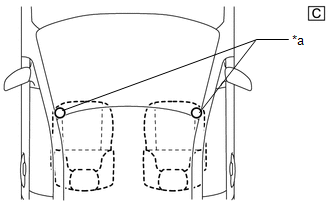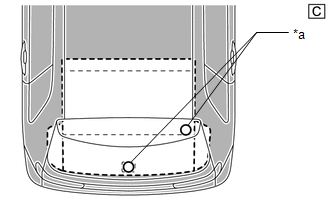| Last Modified: 05-13-2024 | 6.11:8.1.0 | Doc ID: RM1000000028K9I |
| Model Year Start: 2023 | Model: GR Corolla | Prod Date Range: [11/2022 - ] |
| Title: THEFT DETERRENT / KEYLESS ENTRY: SMART KEY SYSTEM (for Start Function, Gasoline Model): OPERATION CHECK; 2023 - 2025 MY Corolla Corolla Hatchback GR Corolla [11/2022 - ] | ||
OPERATION CHECK
CHECK CUSTOMIZE PARAMETERS
(a) The operation check below is based on the non-customized initial condition of the vehicle. (However, make sure that "ACC Customize" is set to "ON" using the multi-display.)
CHECK PUSH-BUTTON START FUNCTION
(a) Check the push-button start function:
(1) except Manual Transaxle:
- Get into the vehicle while carrying the electrical key transmitter sub-assembly with the ignition switch off. With the shift position in P, check that the key indicator display is displayed when the brake pedal is depressed. Check that the engine starts when the engine switch is pressed after the key indicator display is displayed on the multi-information display.
-
While carrying the electrical key transmitter sub-assembly, check that the power source mode changes in the following order when the engine switch is pressed with the brake pedal released: off → ACC* → ON → off.
-
*: When "ACC Customize" is set to "ON" using the multi-display
HINT:
If the engine switch is pressed with the ignition switch ON and the shift position not in P, the power source mode will not change to off, but to ACC.
-
*: When "ACC Customize" is set to "ON" using the multi-display
(2) for Manual Transaxle:
- Get into the vehicle while carrying the electrical key transmitter sub-assembly with the ignition switch off, check that the key indicator display is displayed when the clutch pedal is depressed. Check that the engine starts when the engine switch is pressed after the key indicator display is displayed on the multi-information display.
- While carrying the electrical key transmitter sub-assembly, check that the power source mode changes in the following order when the engine switch is pressed with the clutch pedal released: off → ACC* → ON → off.
-
Check that the steering lock operates when a door is opened.
- *: When "ACC Customize" is set to "ON" using the multi-display
(3) Check the push-button start function operation range for the front side. Place the electrical key transmitter sub-assembly at either inspection point so that it is facing the direction shown in the illustration, and then check that the engine can be started.
NOTICE:
Even if the electrical key transmitter sub-assembly is in a vehicle interior detection area, it may not be properly detected if it is on the instrument panel, in the glove box or on the floor.
HINT:

|
*a |
Electrical Key Transmitter Sub-assembly Inspection Point |
The illustrations shown are examples only.
(4) except Sedan:
Check the push-button start function operation range for the luggage compartment. Place the electrical key transmitter sub-assembly at either inspection point so that it is facing the direction shown in the illustration, and then check that the engine can be started.
NOTICE:
Even if the electrical key transmitter sub-assembly is in a vehicle interior detection area, it may not be properly detected if it is on the instrument panel, in the glove box or on the floor.
HINT:
-
Communication may not be possible if the electrical key transmitter sub-assembly is within 0.2 m (0.656 ft.) of the center of the No. 2 indoor electrical key antenna assembly (inside luggage compartment)*1 or No. 3 indoor electrical key antenna assembly (inside luggage compartment)*2.
- *1: for G16E-GTS
- *2: except G16E-GTS
- Perform this inspection for both inspection points.

|
*a |
Electrical Key Transmitter Sub-assembly Inspection Point |
The illustrations shown are examples only.
CHECK POWER SOURCE MODE CHANGING FUNCTION
NOTICE:
(a) Check the engine switch. (ACC customize "ON")
(1) except Manual Transaxle:
Check that the power source mode changes according to the chart below.
|
Shift Position |
Brake Pedal |
Power Source Mode when Engine Switch Pressed |
|---|---|---|
|
P |
Released |
Off → ACC → ON → off |
|
P |
Released |
Engine running → off |
|
P |
Released |
ACC* → off |
|
P |
Depressed |
Off → engine starts |
|
P |
Depressed |
ACC → engine starts |
|
P |
Depressed |
ON → engine starts |
|
P |
Depressed |
Engine running → off |
|
P |
Depressed |
ACC* → off |
|
N |
Released |
Off → ACC → ON (after power source mode changes to ON, power source mode changes between ON and ACC every time engine switch is pressed) |
|
N |
Released |
Engine running → ACC |
|
N |
Depressed |
Off → engine starts |
|
N |
Depressed |
ACC → engine starts |
|
N |
Depressed |
ON → engine starts |
|
N |
Depressed |
Engine running → ACC |
|
Not P or N |
Released |
Off → ACC → ON (after power source mode changes to ON, power source mode changes between ON and ACC every time engine switch is pressed) |
|
Not P or N |
Released |
Engine running → ACC |
|
Not P or N |
Depressed |
Off → ON |
|
Not P or N |
Depressed |
ACC → ON |
|
Not P or N |
Depressed |
Engine running → ACC |
HINT:
*: This situation is only applicable when the power source mode has changed from ON to ACC.
(2) for Manual Transaxle:
Check that the power source mode changes according to the chart below.
|
Clutch Pedal |
Power Source Mode when Engine Switch Pressed |
|---|---|
|
Released |
Off → ACC → ON → off |
|
Released |
Engine running → off |
|
Depressed |
Off → engine starts |
|
Depressed |
ACC → engine starts |
|
Depressed |
ON → engine starts |
|
Depressed |
Engine running → off |
(b) Check the engine switch. (ACC customize "OFF")
(1) except Manual Transaxle:
Check that the power source mode changes according to the chart below.
|
Shift Position |
Brake Pedal |
Power Source Mode when Engine Switch Pressed |
|---|---|---|
|
P |
Released |
Off → ON → off |
|
P |
Released |
Engine running → off |
|
P |
Depressed |
Off → engine starts |
|
P |
Depressed |
ON → engine starts |
|
P |
Depressed |
Engine running → off |
|
N |
Released |
Off → ON |
|
N |
Released |
Engine running → ON |
|
N |
Depressed |
Off → engine starts |
|
N |
Depressed |
ON → engine starts |
|
N |
Depressed |
Engine running → ON |
|
Not P or N |
Released |
Off → ON |
|
Not P or N |
Released |
Engine running → ON |
|
Not P or N |
Depressed |
Off → ON |
|
Not P or N |
Depressed |
Engine running → ON |
(2) for Manual Transaxle:
Check that the power source mode changes according to the chart below.
|
Clutch Pedal |
Power Source Mode when Engine Switch Pressed |
|---|---|
|
Released |
Off → ON → off |
|
Released |
Engine running → off |
|
Depressed |
Off → engine starts |
|
Depressed |
On (IG) → engine starts |
|
Depressed |
Engine running → off |
CHECK +BA POWER SOURCE MODE CHANGING FUNCTION
(a) Check the +BA power source:
(1) With all of the doors closed, lock the doors using the entry lock function or wireless function.
(2) After 3 minutes or more have elapsed, unlock the doors using the entry lock function or wireless function.
(3) Open the driver door, enter the vehicle and close the driver door.
(4) Check that the multi-information display in the combination meter assembly starts up.
(5) Operate the multimedia switch and check that the multi display starts.
CHECK TRANSMITTER BATTERY SAVING MODE FUNCTION
(a) Check the transmitter battery saving mode function:
(1) Press the unlock switch of the electrical key transmitter sub-assembly twice while pressing the lock switch and check that the electrical key transmitter sub-assembly LED blinks 4 times and enters transmitter battery saving mode.
(2) Check that the smart key system does not operate while in transmitter battery saving mode.
HINT:
To cancel transmitter battery saving mode, press a switch of the electrical key transmitter sub-assembly.
CHECK ENTRY CANCEL FUNCTION
(a) Disable the smart key system and check that all functions of the smart key system no longer operate.
HINT:
When the smart key system is disabled, it is possible to lock and unlock the doors with the wireless function, and the engine can be started by holding the electrical key transmitter sub-assembly near the engine switch.
CHECK KEY DIAGNOSTIC MODE
|
|
|
![2023 - 2025 MY Corolla Corolla Hatchback GR Corolla [11/2022 - ]; THEFT DETERRENT / KEYLESS ENTRY: SMART KEY SYSTEM (for Start Function, Gasoline Model): CUSTOMIZE PARAMETERS](/t3Portal/stylegraphics/info.gif)